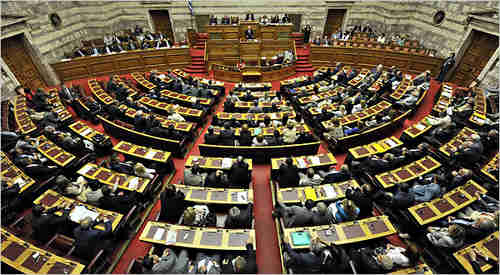Prime minister George Papandreou won a vote of confidence by a vote of 155 to 143 in Greece’s Parliament early Wednesday morning, after giving a passionate speech about the need to learn the lessons of previous wars and about the need for unity, according to Kathimerini. “All Greeks have the duty and the ability to change this country.”
 George Papandreou speaking to Athens Parliament on Tuesday (AFP)
George Papandreou speaking to Athens Parliament on Tuesday (AFP)
However, the vote was anti-climatic, since it accomplished nothing except to avoid the collapse of Greece’s government, which many pundits claimed would have been a major crisis.
TV analysts were stressing the dangers if Panadreou lost the vote, but a lot of it was hyperbole, according to the Guardian:
“[London] analysts were showing off the benefits of a classical education as they waited on Tuesday for the Greek parliament to decide whether it would accept tough new conditions for a bailout. The country faced a Sisyphean task, said one, namechecking the king of Corinth who was condemned to roll a rock up a hill only to see it bounce down again, then repeat the task for eternity. Another scribbler compared the challenge facing Greece to the 12 labours of Hercules.
Top prize for erudition, though, went to Nick Parsons of National Australia Bank, who chose the longest day to compare the long Hellenic power struggle to the story of King Theseus and his bride-to-be Hippolyta in A Midsummer Night’s Dream. The European Union and the International Monetary Fund had handed enormous power to the Greeks, Parsons argued, just as Theseus handed power to Hippolyta by agreeing to lay down his sword.”
The reason that nothing was accomplished is because the real problem is the vote on the austerity measures demanded by the EU and the IMF, and that vote, it turns out, won’t occur until next week, on Tuesday, June 28.
The vote in the Parliament occurred as about 10,000 angry protesters filled the plaza outside, according to Bloomberg. The powerful electricians trade union conducted strikes on Monday and Tuesday, forcing rolling power outages for two days, as a protest against the planned austerity measures. According to a survey, Greeks oppose the austerity measures by 48% to 35%.
Greece’s bankruptcy threatens Greece and Europe
As we reported a couple of days ago, the Eurogroup unexpectedly failed to approve the next tranche, €12 billion, of payout from last year’s bailout commitment. This decision was postponed until early July, just barely in time for Greece to make €4 billion in payments by the week of July 15, or go bankrupt.
By delaying this decision, the Eurogroup handed Papandreou a club with which to beat the legislators into submission, although this whole concept may backfire if it further angers the opponents of the austerity measures before the vote next Tuesday.
The Eurogroup plan was that the €12 bilion would allow Greece to pay its bills until September, and that would give them enough time in July and August to work out the details of an additional €110 billion bailout that would carry Greece through 2012.
But the International Monetary Fund (IMF) has thrown a monkey wrench into that plan, according to the Financial Times (Access).
The IMF is going to block the €12 billion aid payment until the Eurogroup comes up with the details of the additional €110 billion bailout. Suddenly, a relatively simple “just give them the money and kick the can down the road again” decision has turned into a very high-pressure situation, which will lead to many additional crisis meetings in the next two or three weeks.
With the additional bailout, Greece’s total public debt will shoot up from a monumental €350 billion to a completely overwhelming €460 billion. No analyst that I’ve heard or read recently believes that Greece has any chance of repaying that without defaulting.
In this situation, there are two camps of people: Those who say that Greece must continually be bailed out, no matter how much it costs, versus those who say that Greece should be cut loose from the euro, and be allowed to default in its original currency, the drachma.
These choices are like being between Scylla and Charybdis, to use one of my own favorite classical Greek metaphors. However, Odysseus at least had the advantage of knowing where these two monsters lived, and the consequences of confronting either of them.
But today’s financial ministers are completely in uncharted waters. Either of the two choices apparently will lead to a major global banking crisis of unpredictable proportions. A financial crisis for Ireland, Portugal, Italy and Belgium will be almost immediate consequences.
At the very least, Greece’s entire banking system, as well as banks outside of Greece, will collapse, leading to the unstable situation that gave rise to Communism and Fascism in the 1930s, after the collapse of Austria’s Credit-Anstalt bank and Germany’s Danatbank in 1931.
Despite daily meetings, speeches and grand announcements for the past few weeks, not a single financial decision has been made. Every one that was supposed to be made has been postponed. In the meantime, Greece’s crisis has worsened every day.
As I’ve been saying for years, from the point of view of Generational Dynamics, the worst financial crisis in world history cannot be avoided.
COMMENTS
Please let us know if you're having issues with commenting.